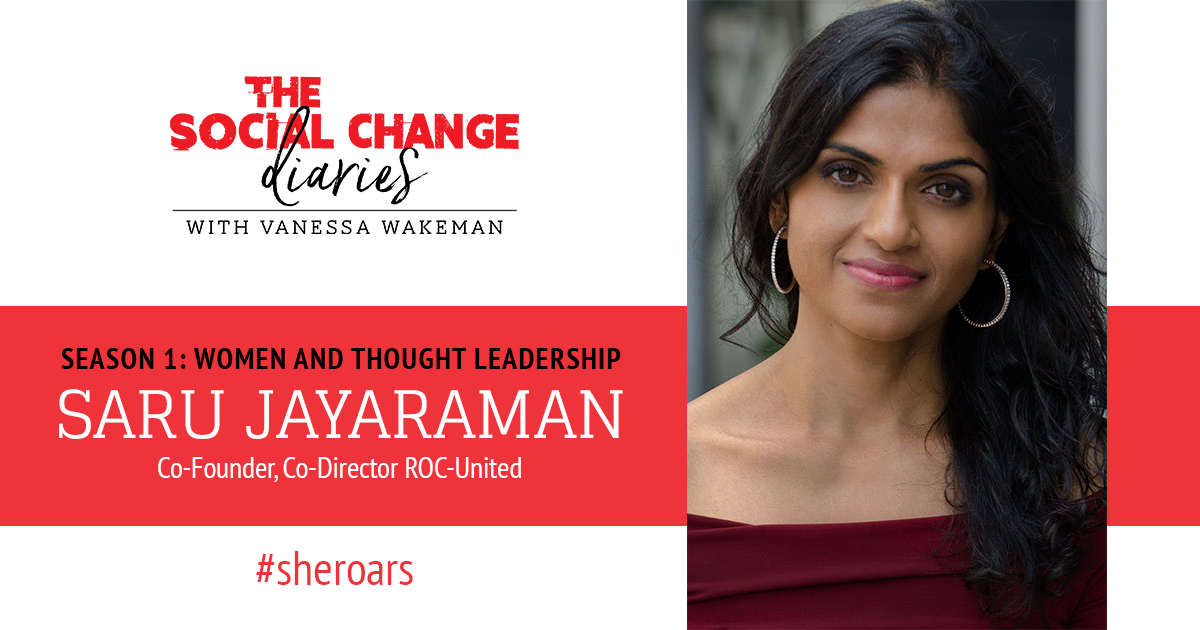
“The older I have gotten and the more I have done this work, I have found vulnerability to be one of the most effective tools in opening our arms, welcoming people in and letting them feel a pat of what we’re doing.”
About This Episode
Saru Jayaraman has been championing the rights of restaurant workers for more than a decade. Her activism and unapologetic pursuit for justice makes her a natural thought leader and visionary.
About Saru Jayaraman
Saru Jayaraman is the Co-Founder and Co-Director of the Restaurant Opportunities Centers United (ROC United) and Director of the Food Labor Research Center at University of California, Berkeley. After 9/11, together with displaced World Trade Center workers, she co-founded ROC, which now has more than 18,000 worker members, 200 employer partners, and several thousand consumer members in a dozen states nationwide.
The story of Saru and her co-founder’s work founding ROC has been chronicled in the book The Accidental American. Saru is a graduate of Yale Law School and the Harvard Kennedy School of Government. She was profiled in the New York Times “Public Lives” section in 2005, named one of Crain’s “40 Under 40” in 2008, was 1010 Wins’ “Newsmaker of the Year” and New York Magazine’s “Influentials” of New York City. She was listed in CNN’s “Top10 Visionary Women” and recognized as a Champion of Change by the White House in 2014, and a James Beard Foundation Leadership Award in 2015.
Saru authored Behind the Kitchen Door (Cornell University Press, 2013), a national bestseller, and has appeared on CNN with Soledad O’Brien, Bill Moyers Journal on PBS, Melissa Harris Perry and UP with Chris Hayes on MSNBC, Real Time with Bill Maher on HBO, the Today Show, and NBC Nightly News with Brian Williams. Her most recent book is Forked: A New Standard for American Dining (Oxford University Press, 2016).
In her words…
“It’s been a process of learning that I, too, am important in this struggle and that my voice is important, so that I can play both a facilitator’s role and lift up other people’s voices, while having a voice myself.”
“We thought ‘who are we to this old, rinky-dink organization?’ but clearly we’re enough of a threat to get them to spend millions of dollars to stop us. Gandhi used to call it moral jujitsu- the idea that you use the power, or the force, of the oppressor against them.”
“I think failure should be seen as an opportunity to learn.”
“When I am often called a difficult woman for not backing down, or not making compromises, I embrace that. I’m a difficult woman! I’m unapologetic about the need to stop throwing workers under the bus and especially in this political moment, the need to stand up with every fiber in our being, and both resist and proactively fight for the things that we need for people in the United States, and as women in the United States.”
Questions Answered on this Episode
-
Thinking about your career and your trajectory, at what point did you think you understood the power of using your voice?
-
In order to be a thought leader and to yield all of this influence, you have to be vulnerable. How do you deal with the vulnerable times when you’re introducing something new?
-
As a woman, do you feel vulnerability dilutes any of the power in your approach and your focus? Like ‘there is something soft about them’ or do you still feel like it’s a powerful resource for you?
-
What would you tell a woman who is just starting out in the non-profit sector, who is full of ideas but doesn’t quite know how to use her voice?

